Key takeaways:
- Peer relationships shape identity, highlighting the importance of emotional connections and understanding diverse perspectives.
- Building trust relies on vulnerability, consistency, and small acts of kindness, fostering deeper bonds.
- Effective communication, including active listening and empathy, is essential for strengthening friendships and navigating conflicts.
- Engaging in collaborative activities and sharing personal stories can deepen connections and create a sense of belonging.
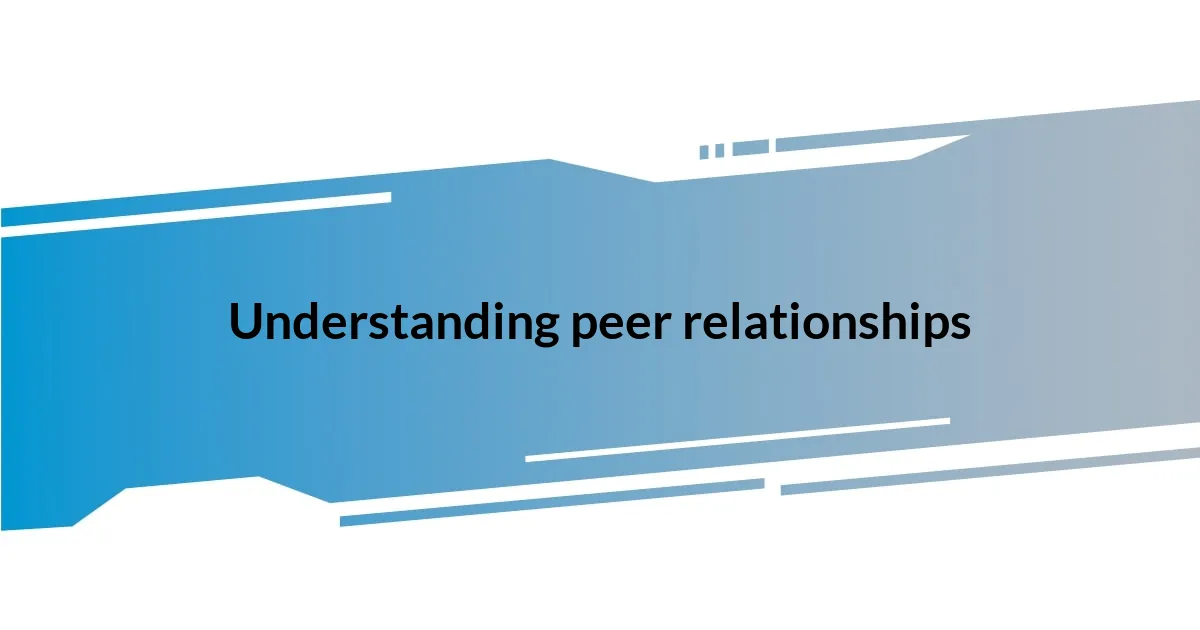
Understanding peer relationships
When I reflect on my own experiences with peer relationships, I often think about how essential they were in shaping my identity. I’ve realized that friendships can sometimes feel like a mirror, reflecting our insecurities and strengths. Have you ever felt more confident in a group of friends who genuinely support you? Those moments truly highlight how vital emotional connections are in navigating life’s challenges.
In high school, I had a friend who was completely different from me, yet our bond was undeniable. This taught me that understanding our peers goes beyond shared interests; it’s about appreciating diverse perspectives. It’s fascinating how these differences can enrich our experiences, don’t you think? My friendship with her pushed me to see the world through an entirely new lens, igniting a curiosity I didn’t know I had.
Another thing I’ve noticed is the importance of trust in peer relationships. I remember confiding in a friend during a tough time, and the relief I felt after sharing my worries. Have you had a similar experience? It made me realize that these relationships thrive on vulnerability and the courage to be open with one another, ultimately strengthening the ties that bind us.
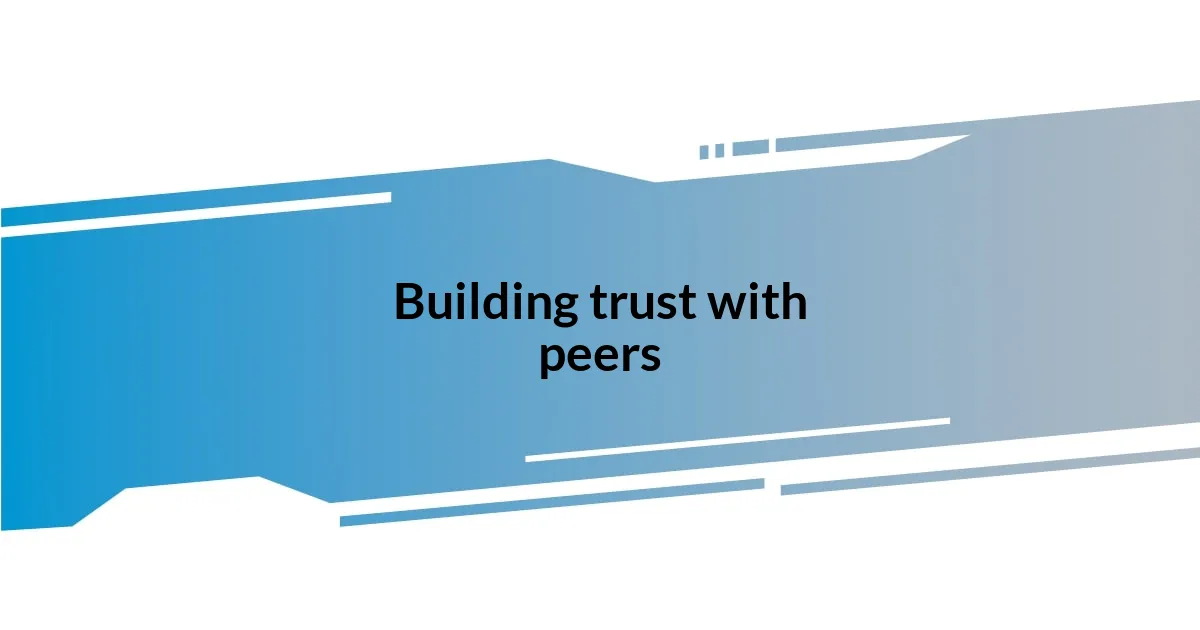
Building trust with peers
Building trust with peers is foundational to meaningful relationships. I remember a moment when I shared a personal struggle with a close friend. Opening up felt risky, but once I did, it led to a deeper understanding between us. That moment taught me that vulnerability can be a powerful catalyst for trust.
As I navigated various friendships, I learned that consistency and reliability play huge roles in building trust. For instance, when I promised to support a friend during a challenging project and delivered on that promise, it solidified our bond. Trust isn’t built overnight; it’s a tapestry woven through shared experiences and mutual respect.
Reflecting on my journey, I can see how trust often grows from little acts of kindness. There was a time when I was having a particularly tough week, and a peer surprised me with a simple note of encouragement. That small gesture not only uplifted my spirits but also deepened my trust in her. It reminded me that trust isn’t just about monumental moments—it’s often the little things that truly matter.
| Trust-Building Elements | Examples |
|---|---|
| Vulnerability | Sharing personal struggles with friends |
| Consistency | Supporting a friend in their time of need |
| Gestures of kindness | Giving a small note or encouragement |
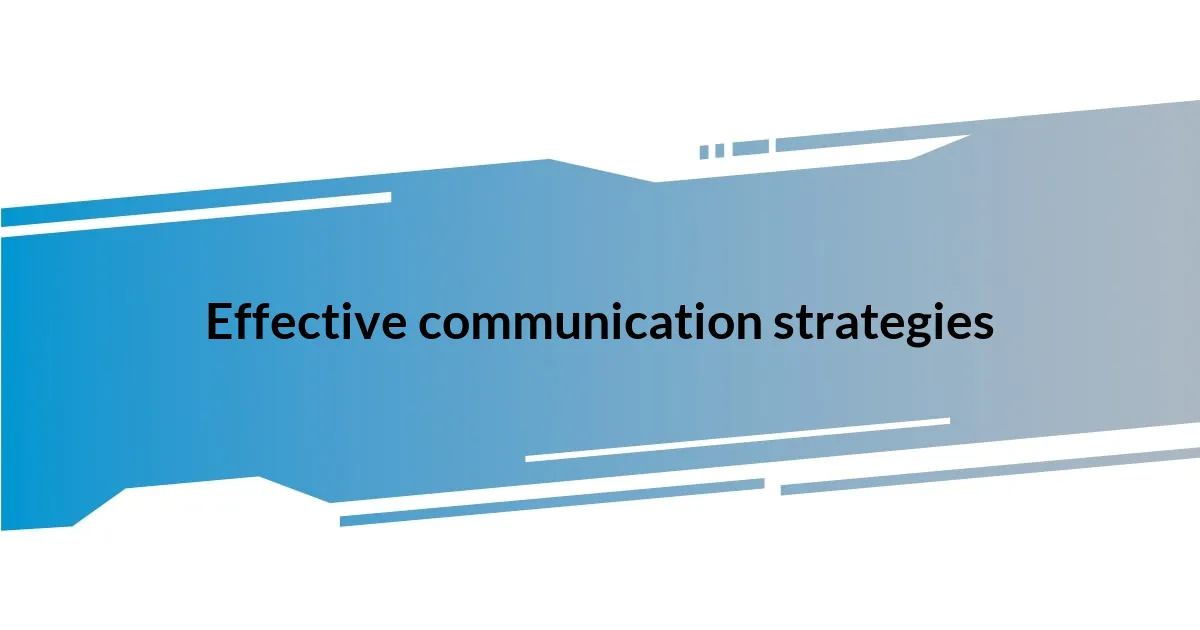
Effective communication strategies
Effective communication is the bedrock of healthy peer relationships. Reflecting on my experiences, I’ve learned that active listening makes all the difference. When I truly focused on what my friends were saying, I found that it not only deepened our conversations but also fostered a sense of connection. I remember sitting with a close friend who was going through a tough breakup; just being present and listening without judgment helped her feel heard and understood.
Some effective communication strategies I’ve found invaluable include:
- Active Listening: Show genuine interest by nodding and providing verbal affirmations.
- Empathy: Try to understand the other person’s feelings; it creates a deeper bond.
- Clarity: Express your thoughts clearly to avoid misunderstandings.
- Non-Verbal Cues: Maintain eye contact and use body language that shows openness and engagement.
In the process of sharpening my communication skills, I discovered the power of asking open-ended questions. They invite deeper discussions and express that you genuinely care. For instance, instead of asking, “Did you have a good day?” I learned to ask, “What was the highlight of your day?” This shift transformed our interactions. I saw how a simple question could lead to laughter or share moments of vulnerability, enriching the friendship. Communication is a dance, and the more I practiced, the more gracefully I could move with my peers.
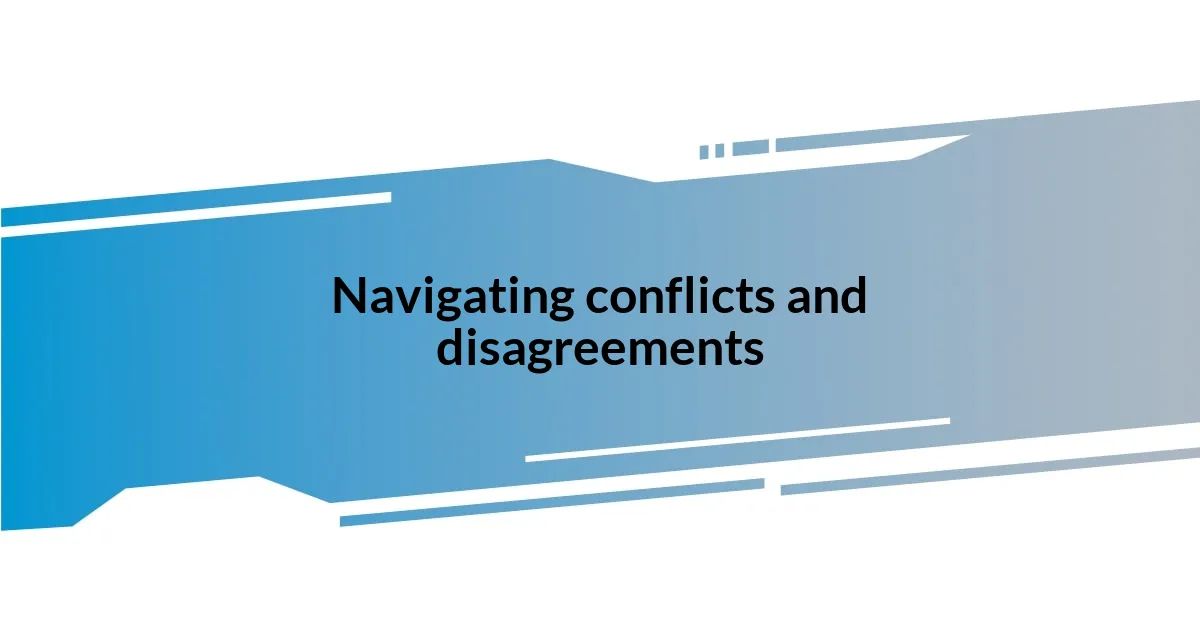
Navigating conflicts and disagreements
Navigating conflicts and disagreements is an essential skill in maintaining healthy peer relationships. I remember a heated argument with a friend over a project we were collaborating on. Instead of letting frustration build, I suggested we take a break and revisit the discussion later. That pause allowed us to reflect and approach the issue with fresh perspectives, ultimately leading us to a solution that incorporated both our ideas.
One of the most critical lessons I’ve learned is the importance of remaining calm during disagreements. There was a time when I felt my emotions escalating during a disagreement. I realized that taking a deep breath and acknowledging my feelings helped me articulate my points more clearly. It’s intriguing how a moment of breath can transform an angry exchange into a productive conversation. Have you ever noticed how your tone can change the entire atmosphere of a conflict?
When conflicts arise, I believe it’s essential to focus on the issue and not the person involved. For instance, during a group project, I once had to address a friend’s lack of contribution. Instead of accusing her, I approached the situation by discussing my concerns about the project’s progress. This shift in approach helped her feel supported rather than attacked, leading us to collaboratively brainstorm solutions. It’s a powerful reminder that how we frame our words can either build bridges or create walls.
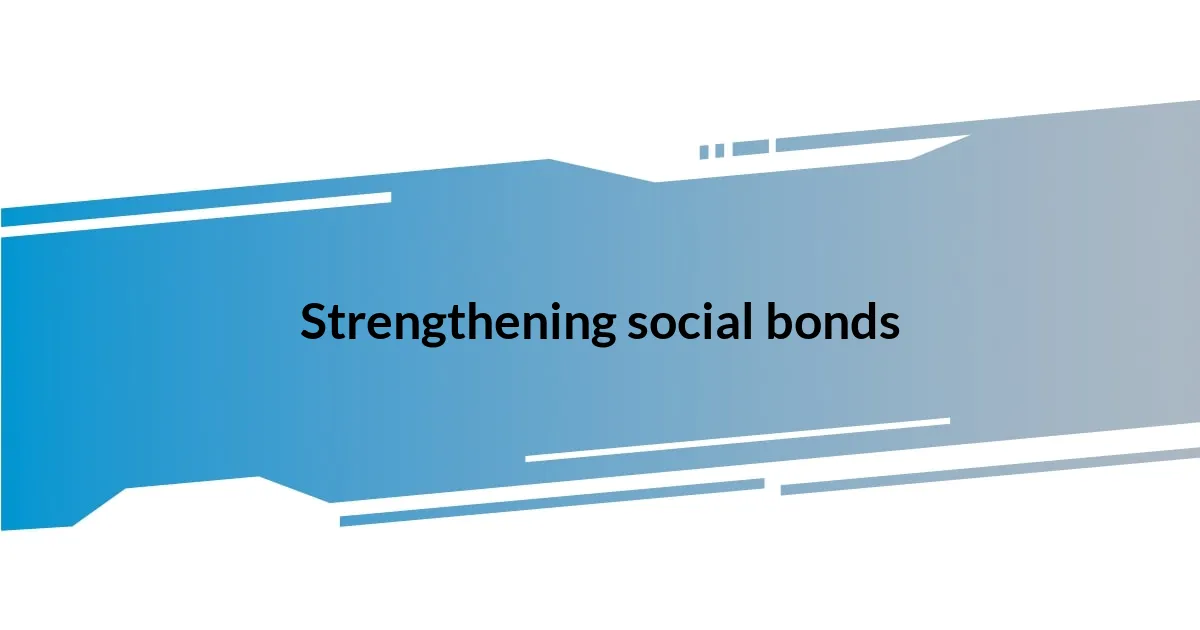
Strengthening social bonds
There’s something remarkably fulfilling about strengthening social bonds. I recall a day at the park with a group of friends. We decided to play a game of frisbee, but it turned into much more than just a physical activity; it became an opportunity to reconnect on a deeper level. As we laughed and cheered each other on, I realized that shared experiences, however simple, can weave stronger threads of friendship.
Another memory that stands out is the time I organized a potluck dinner. Everyone brought their favorite dish to share, and it turned into a delightful evening filled with storytelling and laughter. Each meal prepared carried a piece of someone’s personal story, which sparked rich conversations. Have you ever noticed how food has an extraordinary way of bridging gaps? It’s like a universal language that brings people closer, fostering an atmosphere of trust and warmth.
I’ve learned that vulnerability plays a crucial role in strengthening these social bonds. There have been moments when I’ve bravely shared my personal challenges, and I was astounded by the support and camaraderie that emerged. It’s almost magical how opening up to friends about our struggles encourages them to do the same, creating a safe space where we can grow together. When was the last time you let your guard down? Embracing vulnerability truly can turn acquaintances into lifelong friends.
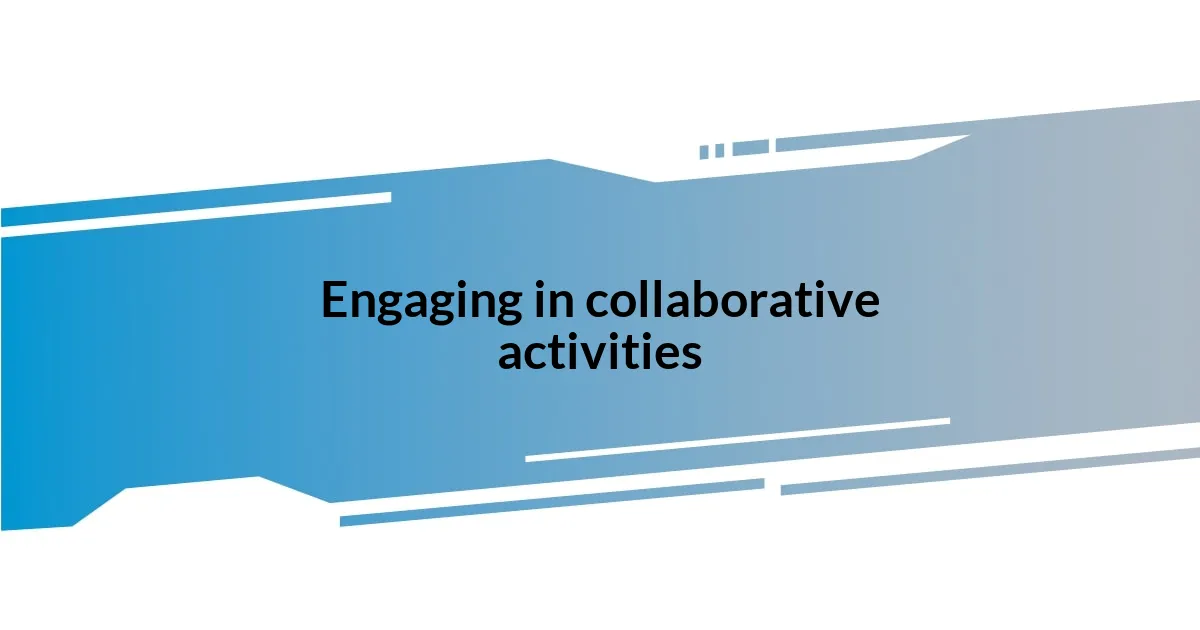
Engaging in collaborative activities
Engaging in collaborative activities can be a game-changer for building peer relationships. I still remember a community art project I joined, where diverse individuals came together with different skills. Collaborating on a mural allowed me to not only share my artistic ideas but also to appreciate others’ perspectives. It was eye-opening to see how our unique contributions melded into a cohesive masterpiece; have you ever felt that rush when teamwork creates something beautiful?
One time, I participated in a team-building workshop that required us to solve puzzles together. Initially, I felt overwhelmed by the different personalities around me. However, as we worked through challenges, I noticed how everyone’s strengths shined in their own way. I learned that listening and valuing each person’s input was crucial, and it fostered an inclusive environment. Isn’t it fascinating how problem-solving can reveal so much about individuals while simultaneously fortifying bonds?
A standout moment for me was during a charity event, where we were tasked with organizing a fundraiser. I took the initiative to assign roles based on everyone’s interests, which turned out to be a pivotal decision. As I watched each member thrive in their assigned tasks, it made me cherish the power of collaboration. It’s amazing how engaging together toward a common goal can not only enhance relationships but also create a sense of belonging. Have you ever experienced the unity that comes from a shared purpose?
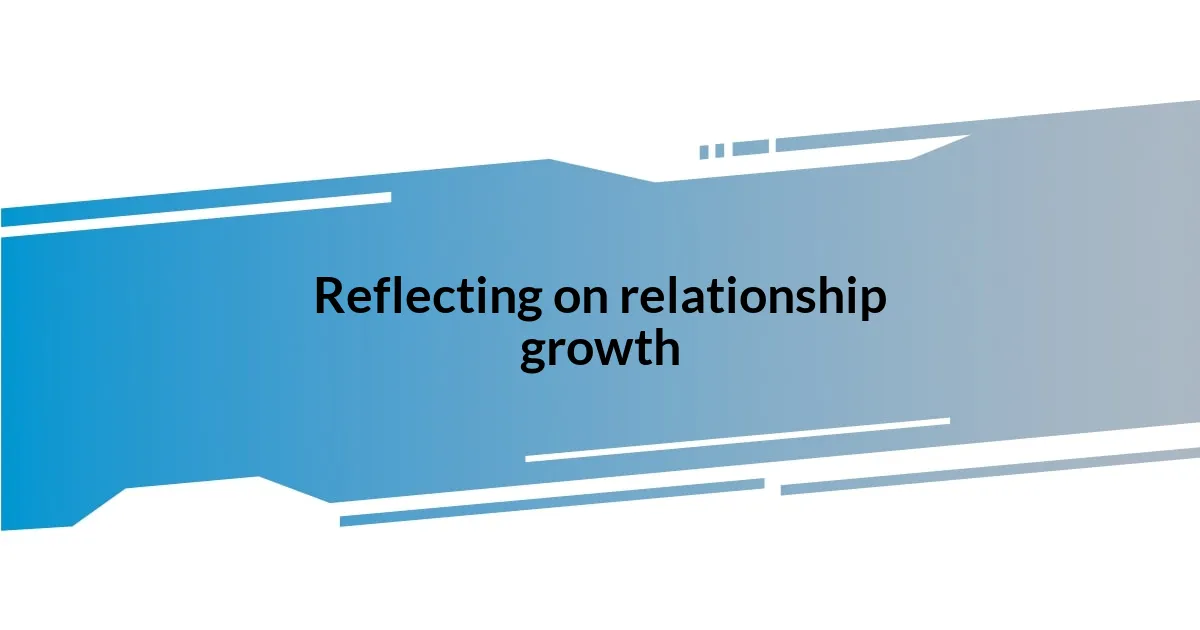
Reflecting on relationship growth
Reflecting on my relationship growth often brings to mind a weekend retreat I attended with friends. We spent hours sharing our thoughts and feelings, which not only deepened our understanding of each other but also revealed aspects of ourselves we hadn’t shared before. Have you ever found that moments of honest reflection can create unexpected bonds? This experience taught me that vulnerability is a two-way street, inviting others to open up and strengthen our connections.
Another poignant moment was when I caught up with a childhood friend after years apart. As we reminisced about our past, we also navigated how life had shaped us differently. That conversation struck me because it reminded me that relationships evolve over time, and it’s essential to embrace those changes. Have you thought about how your friendships shift and adapt? When I realized that we could still relate despite those differences, it felt like a significant milestone in our relationship journey.
I also vividly recall a time when I reached out to a former colleague to reconcile a misunderstanding. I felt nervous initiating that conversation; still, I was surprised by the genuine warmth and understanding that emerged. This experience solidified my belief that addressing conflicts directly can lead to greater intimacy and trust. Have you ever been surprised by how a tough conversation can enhance a relationship? Through this, I learned that confronting issues may feel daunting, but it can also pave the way for profound relationship growth.